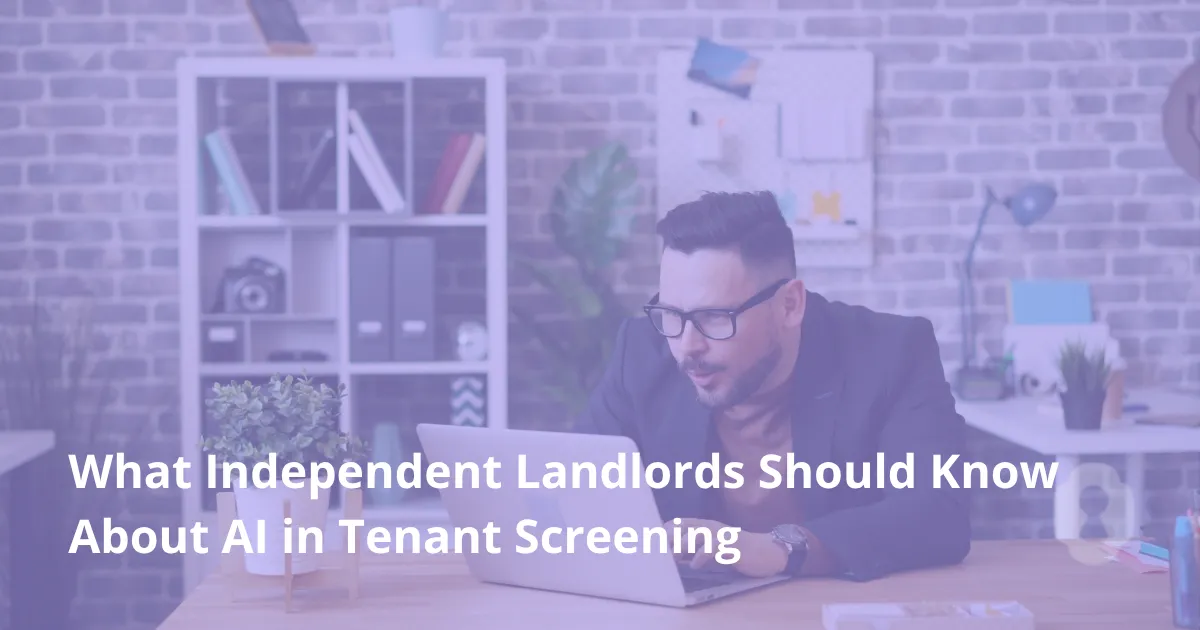
Did you know that evicting a tenant in the U.S. can cost between $2,000 and $5,000?

This shows how crucial tenant screening is for landlords.
Now, artificial intelligence in property management offers a game-changing tool for picking tenants.
AI-powered tenant screening is changing the rental world. It lets landlords make quicker, smarter choices. AI looks at lots of data, like rental history and credit reports, to spot risks and lower eviction costs.
The real estate industry has undergone significant transformation as machine learning algorithms replace outdated manual processes. Traditional methods often created bottlenecks in the leasing process, forcing landlords and property managers to rely on limited information that frequently missed crucial red flags.
Modern tenant screening technology leverages sophisticated analytics to process vast amounts of data, enabling property owners to make more informed decisions about prospective tenants.
Manual rental application process methods created substantial inefficiencies for individual renters and property owners alike. Existing screening practices often overlooked critical factors beyond basic financial metrics, leading to incomplete assessments that could result in problematic tenancies.
These outdated approaches particularly struggled with document fraud detection and failed to provide comprehensive insights into applicant reliability.
Old ways of screening tenants often miss the mark. They use just one credit score, which isn't enough.
This can lead to problems like:

Integrating AI into the tenant screening process allows screening companies to deliver accurate screening results by analyzing multiple data sources simultaneously. Machine learning systems can process public records, employment history, and behavioral patterns to create comprehensive screening reports.
This technological advancement helps landlords to make more informed decisions while reducing the time between application submission and approval.
AI is making tenant screening better by looking at more information.
This includes:
Modern tenant screening services offer independent property owners unprecedented advantages through automated application analysis and risk assessment. The power of AI lies in its ability to process complex datasets that would be impossible for humans to analyze efficiently. Screening software now provides detailed insights that help property owners identify reliable tenants while maintaining compliance with housing regulations.
AI systems significantly reduce processing time by automating tenant verification and background checks that previously required days or weeks to complete. The decision-making process becomes more efficient as screening is its ability to instantly cross-reference multiple databases and flag potential concerns.
This automation particularly benefits landlords in California and other high-volume rental markets where quick turnaround times are essential for maintaining occupancy rates.
Predictive modeling allows property owners to assess renter reliability using comprehensive data analysis rather than relying solely on traditional financial indicators. Tenant screening comes with enhanced accuracy when algorithms analyze patterns in rent payment history, eviction records, and other behavioral indicators.
This approach helps identify tenants who may have strong payment capacity despite non-traditional credit profiles.
"AI-powered screening has revolutionized the way we select tenants, making the process more efficient and reliable."
Effective tenant screening tech reduces vacancy periods by identifying applicants most likely to fulfill lease terms successfully. Data security protocols ensure that sensitive information remains protected throughout the evaluation process while enabling thorough assessment of applicant qualifications.
Property owners report significant reductions in turnover when using comprehensive screening that goes beyond surface-level financial metrics.

Advanced algorithms examine multiple data points to create comprehensive applicant profiles that traditional methods often miss. Tenant background check systems now incorporate sophisticated fraud detection capabilities that identify inconsistencies in submitted documentation.
This multi-layered approach provides property owners with detailed risk assessments that support better tenant selection decisions.
Modern assessment tools analyze income stability, debt-to-income ratios, and spending patterns to predict rent payment reliability. Financial services integration allows these systems to access real-time banking data and employment verification, providing more accurate financial pictures than static credit reports.
Data to predict payment behavior includes analysis of utility payments, subscription services, and other recurring financial obligations.
Eviction records analysis goes beyond simple yes-or-no determinations to examine circumstances and patterns surrounding previous rental issues. These models consider factors such as lease compliance history, property maintenance cooperation, and communication patterns with previous landlords.
Rental housing providers benefit from predictive models that identify potential problem tenants before lease signing.
Automated systems streamline tenant verification by instantly accessing multiple databases while maintaining compliance with local and federal regulations. Public records searches now include enhanced accuracy checks that reduce false positives and ensure applicant privacy rights remain protected.
This automation particularly benefits property managers handling multiple applications simultaneously.
Property owners must navigate complex regulatory requirements while implementing AI-powered screening solutions. The consumer financial protection bureau provides guidance on fair lending practices that extend to rental housing decisions.
Understanding these frameworks helps property owners leverage technology benefits while avoiding discrimination claims and regulatory violations.
The Fair Housing Act requires that screening companies design algorithms to avoid disparate impact on protected classes. Regulator oversight has increased focus on ensuring that machine learning algorithms don't perpetuate historical biases that have affected black and Latino renters disproportionately.
Property owners must work with vendors who demonstrate compliance through regular algorithm testing and bias detection protocols.
To follow fair housing laws, landlords should:
For more on AI's ethical and legal hurdles in real estate, check out this article.
Data security requirements mandate that tenant screening services implement robust protection measures for sensitive personal information. Individual renters have rights to understand how their data is collected, processed, and stored throughout the screening process.
Property owners must ensure their chosen platforms provide transparent data handling practices and comply with state privacy regulations.
Important tenant privacy rights include:
Tenant advocates increasingly demand transparency in automated decision-making processes that affect housing access. The rental application process must include clear explanations of how AI systems evaluate applications and what factors influence approval or denial decisions.
Property owners should choose platforms that provide detailed reasoning for screening decisions to maintain transparency and reduce potential disputes.
"Transparency in AI decision-making is not just a legal necessity; it's a way to build trust with tenants and applicants."
While AI offers significant advantages, property owners must understand potential limitations and implementation challenges. Future trends in AI development will likely address current shortcomings, but today's systems require careful oversight and human judgment.
Understanding these limitations helps property owners make informed decisions about technology adoption and implementation strategies.
Machine learning systems can inadvertently perpetuate historical discrimination patterns present in training data. Affordable housing advocates have raised concerns about algorithms that may systematically exclude certain demographic groups from rental opportunities.
Property owners must choose screening software that undergoes regular bias testing and provides audit trails for decision-making processes.
The balance between automation and human oversight remains crucial for effective tenant screening implementation. AI systems excel at data processing but may miss nuanced circumstances that require human interpretation and empathy.
Property managers should maintain review processes that allow for manual override of automated decisions when justified by specific circumstances.
Screening reports accuracy depends heavily on the quality and completeness of underlying data sources. Outdated or incorrect information in public records can lead to inappropriate tenant rejections or approvals.
Property owners should understand data source limitations and implement verification procedures for critical screening decisions.
Successful AI adoption requires careful planning and strategic implementation that aligns with business objectives and regulatory requirements. Landlords and property managers should evaluate their specific needs and market conditions before selecting screening solutions.
Proper implementation can significantly improve operational efficiency while reducing risk exposure.
Property managers should assess tenant screening technology based on integration capabilities with existing property management systems. Evaluation criteria should include data security protocols, compliance with local regulations, and the ability to customize screening parameters for different property types.
Screening companies vary significantly in their feature sets and compliance capabilities.
Few key points:
For more on AI in tenant matching, check out Rapid Innovation's blog on AI Agent Tenant Matching.
Independent property owners must weigh the costs of screening software against potential savings from reduced vacancy periods and improved tenant selection. The rental housing market dynamics in specific areas should influence technology investment decisions.
Tenant screening services often provide scalable pricing models that accommodate smaller portfolio owners.
Effective implementation combines automated application analysis with strategic human oversight points throughout the evaluation process. The tenant screening process should include clear escalation procedures for complex cases that require manual review.
This hybrid approach maximizes the benefits of AI while maintaining the flexibility to address unique circumstances that automated systems might handle inappropriately.
"The future of tenant screening lies in striking the right balance between technology and human insight."
A good hybrid process might include:
By using these strategies, independent property managers can enhance their tenant screening. They can do this while keeping a personal touch that sets them apart.
AI is changing how we manage rental properties. Now, independent landlords can make better choices with advanced tools for screening tenants. These tools help reduce empty spaces, lower tenant changes, and make the application process smoother.
AI in tenant screening brings many benefits. It makes picking the right tenants more accurate and makes applying easier. As AI gets better, landlords need to keep up to stay ahead.
Using AI for tenant screening helps landlords improve their management. It also helps the industry grow. AI can automate tasks and give insights, making property management more efficient and effective.